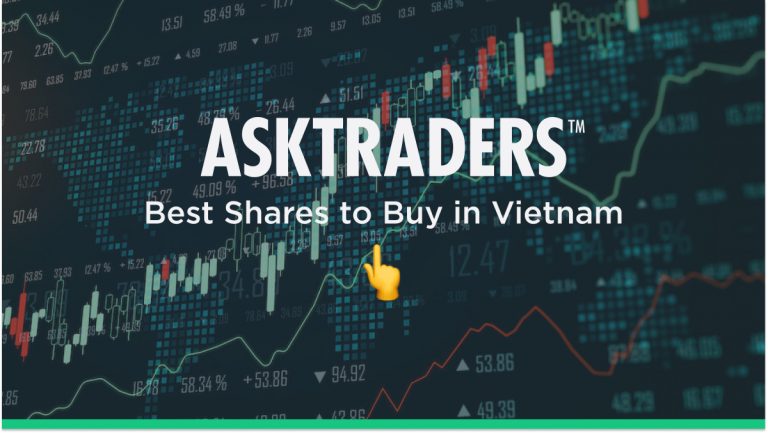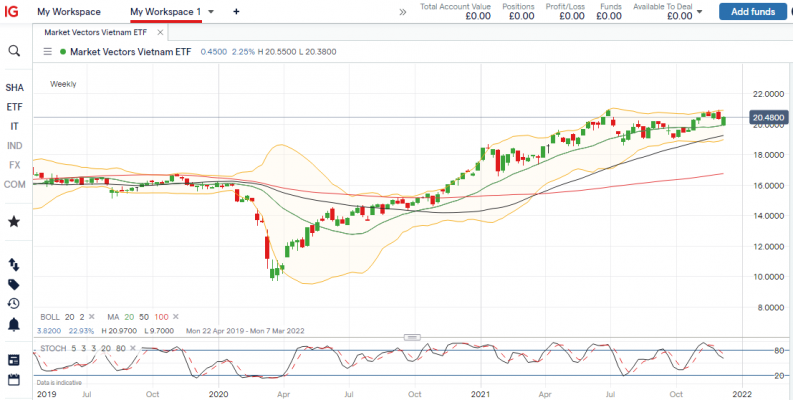
Per the World Bank, Vietnam went “from being one of the world’s poorest nations to a middle-income economy in one generation. Between 2002 and 2020, GDP per capita increased 2.7 times, reaching almost US$2,800. Over the same period, poverty rates (US$1.90/day) declined sharply from over 32 percent in 2011 to below 2 percent” (source: Worldbank).
The investment community, driven by prevailing low-interest rates and the desire for better than average returns, discovered the growth prospects and potential for financial gain in Vietnam some years back. Today we now have Exchange-Traded Funds (ETFs) that follow the stock market indices for this thriving nation, and brokers have extended their network to include access to this market and individual securities listed on its two stock exchanges, making some of the best stocks in Vietnam a promising investment.
How did the COVID-19 pandemic impact Vietnam’s economy? One popular ETF reflects that the miracle is still in action. Stocks may have dipped in early 2020, but they soon rebounded above pre-COVID levels, accelerating to new heights before finally plateauing at roughly 25% above share price levels that existed at the end of 2019. In other words, investors have confidence in this market and the political regime that is promoting a more open economy, and that inhabitants are willing to work hard to improve their lot.

Chart courtesy of the IG Group
There is a plan to combine the two stock exchanges in Vietnam. The Ho Chi Minh Exchange (HOSE), located in the nation’s capital, is the largest and handles large-cap issues. A total of 377 companies are listed here with $180m in daily average trading volume. The Hanoi Exchange (HSX) is the home primarily for small to medium-sized listings. It is comprised of 367 listings with daily turnover of around $39m.
The Socialist Republic of Vietnam has made a great effort to transition away from a centralised economic model to a ‘mixed socialist-oriented market economy’. Government officials have a long-term goal to move from 37th to the 20th largest economy in the world by 2050. This goal will require more capital and a willingness to grow the economy at over 5% a year over that period. The regime eased restrictions on foreign investment in 2015, a move meant to encourage an inflow of capital. Challenges remain, but Vietnam is focused on the future.
What individual Vietnamese stocks are worthy of consideration now?
The easiest way to invest in Vietnam is via shares in a related ETF that follows the major stock offerings in the country. Buying individual shares in local listings may be problematic. Policies related to foreign investment in the country have been liberalised relative to major capital inflows for project-oriented investments and corporate entities. But individuals still have ‘red tape’ to deal with, one thing being the necessity for a local bank account – not easy in today’s day and age.
There are local brokers with English-speaking staff that can help you weave through the local regulations, but there is an easier way. You would need to find a broker that has a direct connection or relationship with a Vietnamese broker in order to gain access. The broker would then buy and sell on your behalf, holding the shares in your name in a ‘nominee account’.
The two stock exchanges comprise just over $186bn in total market capitalisation, with HOSE handling the major cap stocks and HSX, small to medium issues. The Vietnamese Dong (VND) is relatively stable since it is managed within limits as if quasi-pegged to the US Dollar. Snapshots are provided below of the Top Dozen listings, which range in market cap from $16.8bn to $6.8bn (Based on an exchange rate of 1 VND = 0.000043 USD). These companies represent the best shares to buy in Vietnam.
- Vingroup JSC: MCap = 390T VND – Real Estate Development – The firm operates several divisions: Sales of Inventory Properties; Leasing Investment Properties and Related Services; Hospitality, Entertainment, and Related Services; Health Care and Related Services; Education and Related Services; Retail Services; and Others.
- Joint Stock Commercial Bank for Foreign Trade of Vietnam: 364T VND – Regional banks – This financial institution deals in commercial and consumer banking, including trade finance and investments.
- Vinhomes JSC: 355T VND – Real Estate Development – The firm focuses on the services end of its industry, including consulting, brokerage, auction real estate and auction land use rights.
- Hoa Phat Group JSC: 213T VND – Trucks/Construction/Farm Machinery – This company engages in the manufacture, trade, export, and import of iron and steel and related minerals, along with products made from these materials, including construction and farm machinery, trucks, and refrigeration products.
- Gas Natural SDG SA: 185T – Energy and Integrated Oil – This firm is a Spanish-based company that is engaged actively in the local energy sector. It handles gas and electricity distribution, supplies retail, industrial, and power plant facilities, and generates electricity.
- Vietnam Dairy Products Corp.: 181T VND – Dairy Industry – It produces and distributes a full range of milk-related products both locally as well as to Australia, Cambodia, the Philippines, and the United States.
- Masan Group Corp.: 179T VND – Investment Holding Company – The firm engages in consumer products, financial services, and resources sectors. Its major segments include Food and Beverage, Mining and Processing, Animal Nutrition, and Financial Services.
- Vietnam Technological & Commercial Joint Stock Bank: 176T VND – Banking Institution – This firm focus on basic banking services, including credit and debit cards, loans, savings and checking accounts, corporate financing, electronic banking, foreign exchange, deposits and capital trading.
- JSC Bank for Investment & Development of Vietnam: 175T VND – Regional Banking – This firm’s forte is providing investment banking services to individual customers, corporate customers, and financial institutions.
- Airports Corporation of Vietnam: 174T VND – Transportation – This firm deals with every aspect of Vietnam’s aviation airport services, including investment, development, operation, and maintenance.
- No Va Land Investment Group Corp.: 166T VND – Real Estate Development – This company engages in the construction of all kinds of houses, roads, irrigation, drainage systems, and other construction works, while also handling real estate brokerage and management services.
- Vietnam Prosperity Joint-Stock Commercial Bank: 158T VND – Banking Institution – This banking entity offers personal banking accounts, card services, savings products, payment account, Remittance service, loans, promotions, other services, and E-banking.
How to buy stocks in Vietnam
There are five steps to invest in shares in Vietnam:
- Choose a broker: A subset of international online brokers can give you access to a Vietnam ETF, including IG Group. Gaining direct access to individual shares of Vietnamese companies will require much more work, but it is not impossible. Let safety and security be your guiding principles.
- Open and fund an account: Compliance with Know-Your-Customer (KYC) and Anti-Money Laundering (AML) statutes will require your submission of personal ID information before your account can be approved and opened. Funding will follow. Start small, and when confident, increase your account balance per your budget.
- Open an order ticket and set your position size: Practice on a free demo system will make this step easier, since there will be several options for your review. Do not forget your risk management training related to position sizing and stop-loss order settings.
- Set your stops and limits: Based on your target investment and your budget, set your risk management stops and limits as appropriate.
- Make your purchase: You may now enter your amount on the order and hit the ‘buy’ button – unless you are dealing through a different brokerage relationship for direct company access. Monitor your purchases from time to time and adjust as needed.
Concluding Remarks
Vietnam has rebounded from being an impoverished, war-torn country to one of the fastest-growing economies on the planet and all within one generation. This truly remarkable success story shows no signs of slowing down, and the political powers that be have set their sights high for the next 25 years, hoping to ascend to the ranks of being the 20th largest economy in the world. Investors are impressed and want to participate in this growth opportunity, whether through a related ETF or through direct access to shares in individual companies.
Devoting a portion of your portfolio to this market may surely be worthy of your consideration. Choosing a safe broker to guide your efforts and investments over time is, of course, advised.




